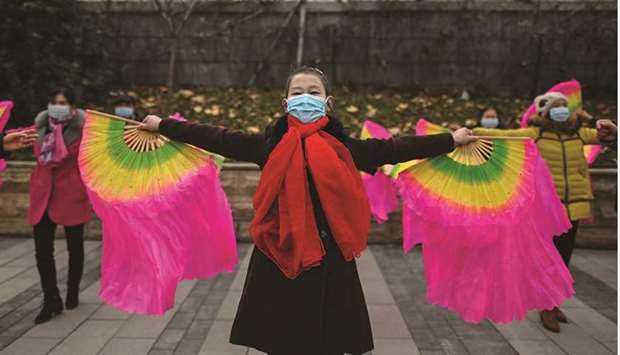The Chinese city of Wuhan marked one year since the start of its traumatic 76-day coronavirus lockdown yesterday, while the pandemic raged elsewhere and governments scrambled to put in place new measures.
Europe faced a worsening struggle with production woes hitting supply of the AstraZeneca/Oxford vaccine as well as the Pfizer/BioNTech shot.
Around the world, more than 2.1mn people have died of Covid-19 since it emerged in China in December 2019, with over 98mn infected.
In the world’s worst-hit country, US President Joe Biden warned America’s death toll could pass 600,000, the highest estimate yet that would mark a devastating rise on the 400,000 fatalities so far.
But the picture was vastly different in Wuhan, where humming traffic, bustling sidewalks, and citizens packing parks and public transport underscored the scale of the recovery in the metropolis of 11mn where the pathogen first emerged before going global.
“I think Wuhan is quite safe now, safer than my hometown and most places in China,” 21-year-old resident Wang Yizhe said.
Elsewhere in China, new outbreaks have prompted harsh responses.
Thousands of Hong Kongers in Jordan, one of the city’s poorest and most densely-packed districts, were ordered to stay home yesterday unless they can show a negative test, in the city’s first lockdown.
AstraZeneca said late Friday that “lower yield” at one of its vaccine-making sites would affect deliveries across Europe.
Lithuania estimated it would receive 80% fewer AstraZeneca doses than hoped in the first quarter, although German and French ministers tried to reassure the public of a steady supply.
Deliveries of Pfizer-made shots to the continent’s countries are already behind schedule as the US firm upgrades capacity at a Belgian plant.
At a meeting with AstraZeneca representatives, the EU Commission “insisted on a precise delivery schedule on the basis of which member states should be planning their vaccination programmes”, Health Commissioner Stella Kyriakides tweeted.
Already cleared for use in Britain, EU authorities are expected to give the vaccine the green light at the end of January.
The World Health Organisation reassured that fabric masks should still work in hindering the spread of new variants from Britain, South Africa and Brazil.
In Wuhan, a team of World Health Organisation experts was still in hotel quarantine ahead of a mission to investigate the source of the virus.
“All hypotheses are on the table,” WHO emergencies director Michael Ryan told a press conference in Geneva.
“And it is definitely too early to come to a conclusion of exactly where this virus started, either within or without China.” But there was good news Friday for poorer nations, as the WHO and pharmaceuticals giant Pfizer announced a deal for up to 40mn initial doses of the Pfizer-BioNTech vaccine to be made available to them through the Covax global pool.
A separate deal, brokered by international agencies working with the WHO, will supply developing nations with tens of millions of rapid antigen tests at half the usual $5 price.

Women wearing face masks as a preventive measure against the Covid-19 coronavirus dance next to a street in Wuhan, in China’s central Hubei province, yesterday.
